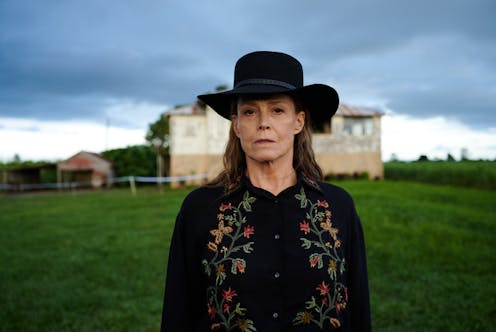The Lost Flowers of Alice Hart brings melodrama and Sigourney Weaver as a flower-obsessed matriarch to streaming
- Written by Ari Mattes, Lecturer in Communications and Media, University of Notre Dame Australia

In Melodrama Revised[1], an essay from 1998, film theorist Linda Williams suggests melodrama situates the audience in a direct empathetic relationship with a victim, so we emotionally experience the victim’s subjugation and then triumph with their overcoming. Oscillating between pathos and action, this is the dominant mode of popular American cinema (and culture more broadly).
She’s right – but then there’s melodrama and Melodrama, the kind that makes us think of soap operas and damsels tied to train tracks.
The new Australian seven episode TV series The Lost Flowers of Alice Hart is Melodrama of the Peyton Place variety, though some of the excesses that make something like Peyton Place (or its low rent cousin, Valley of the Dolls) so enjoyable are sorely missing.
We’re left with solid, well shot, naturalistic and thoroughly middlebrow stuff; a show that distracts us in a mildly pleasurable fashion without the fireworks and dynamics we might desire from the campier versions of its ilk. At the same time, it’s not nearly as brilliant as the closest show I can think of for comparison, also based on an Australian novel, Big Little Lies.
All is not as it may seem
Based on the book by Holly Ringland, the narrative follows Alice Hart, a young girl from an abusive household who, orphaned, is forced to live with her grandmother, June (Sigourney Weaver), on Thornfield Farm. June, who has a complex history with abuse herself, has set up the farm – which cultivates flowers – as a refuge for desperate women.
Early on, we get a sense that all is not as it may seem – that Thornfield Farm, as perhaps indicated by its 19th century gothic sounding name, does not exactly function as the blissful redemptive paradise it at times appears.
We also see, early on, that while June appears to be a strong and compassionate woman, she’s also someone who demands things go her way. And, as the series progresses, she is predictably increasingly revealed as a manipulative, unyielding and egotistical matriarch.
For the first three episodes, Alice is a young girl. For the final half, the narrative jumps ahead 14 years. Alice is a young woman.
After discovering some of her grandmother’s depredations, she sets out on her own, away from the flower farm where she came of age. Based on her knowledge of floriculture, she secures a job as a park ranger apparently on the look out for flower poachers (!). She meets a guy, and things seem to be working out well for Alice.
Alas, in TV land patterns conveniently repeat at the right times, and this flower unfolds as we imagine it would in a show about intergenerational patterns of abuse.
Read more: Arresting, dry and fast-paced: ABC series Bay of Fires brings a new humour to the tradition of Australian Gothic[3]
Effectively rendered
All of the elements of Lost Flowers are effectively rendered. The performances, from a mostly inexperienced cast, are excellent.
Alyla Brown as Young Alice manages to combine vulnerability, enthusiasm and naivety in a way that perfectly captures the effects of her circumstances on her development. Alycia Debnam-Carey is similarly effective playing the older Alice and, as usual, is a delight to watch.
Veteran Weaver – who is an executive producer of the show – dominates her scenes as the flower-obsessed matriarch, lending her character an unsettling blend of fastidiousness, voraciousness and desperation. (Really the only performance that seems strained is from Asher Keddie playing Sally Morgan, a meddling and concerned librarian who probably isn’t meant to be as annoying as she comes across.)
The cinematography makes the most of the locations – it has “Australian coastal town” stamped all over it, which can’t hurt the export value of the show for Amazon – with sweeping images of women on farm and beach interspersed with close-ups of uncomfortable looks matching pregnant silences in the dialogue.
The music, by Hania Rani, is technically the weakest link – the score is based around simple piano music that generically fits the bush-Gothic mode (yes, we have seen The Piano), but is overused, accompanying, it seems, virtually every scene.
Pop fiction
Overall, there’s nothing wrong with The Lost Flowers of Alice Hart. It’s beautifully designed and shot in an entirely conventional fashion; the performances are mostly exacting and detailed; the story is effective in situating us in an empathetic relation with its protagonist; and it convincingly reflects some of the psychological complexities around the interplay of affection and abuse.
It’s a sentimental but sufficiently distracting diversion – and isn’t this what TV is all about? – that probably would be better suited to network TV than streaming. I fear that if it can be easily replaced by something else on the list, it will be.
The idea of sitting back and watching one episode of this a week at the same time – maybe sometimes dozing in one’s armchair – is appealing, but there’s nothing compulsive about the show. The hooks aren’t deep enough, the mystery isn’t compelling enough, to prompt the kind of binge watching that seems so necessary for the success of contemporary TV drama.
There’s nothing “deep” about it – like its source novel, it’s pop fiction – but why should there be? It’s TV, which has its own medium specific pleasures.
The Lost Flowers of Alice Hart is on Prime Video from tomorrow.
Read more: Melodramatic potboilers, worthy classics and DIY escapism: a brief history of the beach read[5]
References
- ^ Melodrama Revised (www.scribd.com)
- ^ CC BY (creativecommons.org)
- ^ Arresting, dry and fast-paced: ABC series Bay of Fires brings a new humour to the tradition of Australian Gothic (theconversation.com)
- ^ CC BY (creativecommons.org)
- ^ Melodramatic potboilers, worthy classics and DIY escapism: a brief history of the beach read (theconversation.com)

















